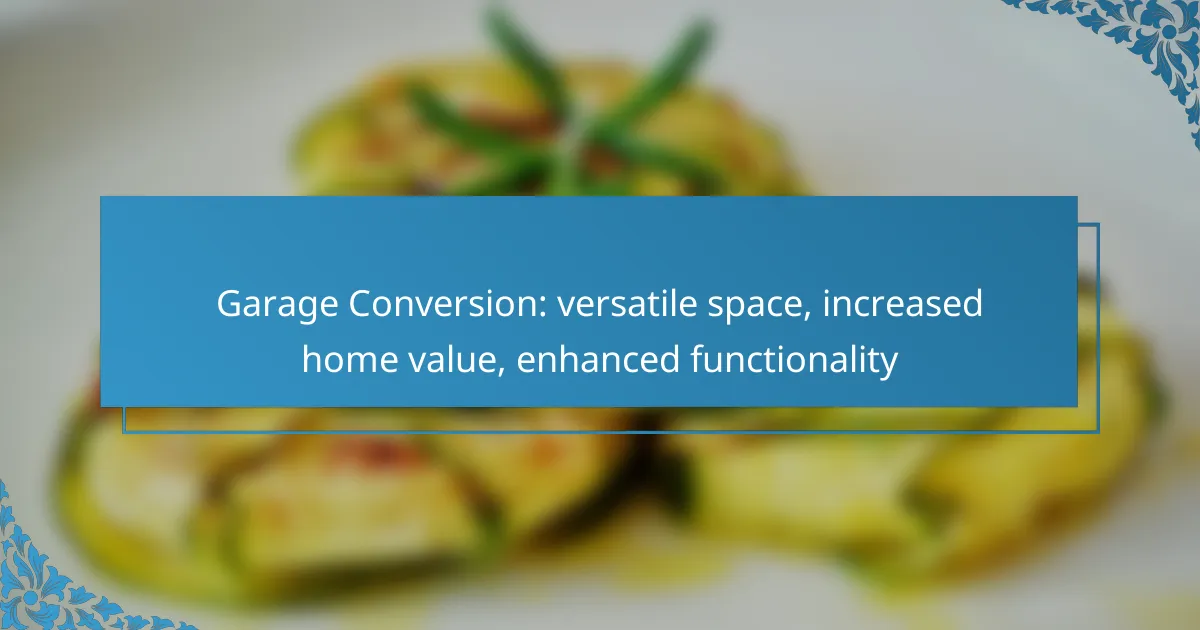A garage conversion offers a unique opportunity to transform an underused space into a versatile area that enhances both functionality and property value. By creating a home office, guest suite, or recreational area, homeowners can cater to their specific needs while appealing to potential buyers in a competitive market. Before embarking on this project, it’s crucial to understand the necessary permits and local building regulations to ensure compliance.
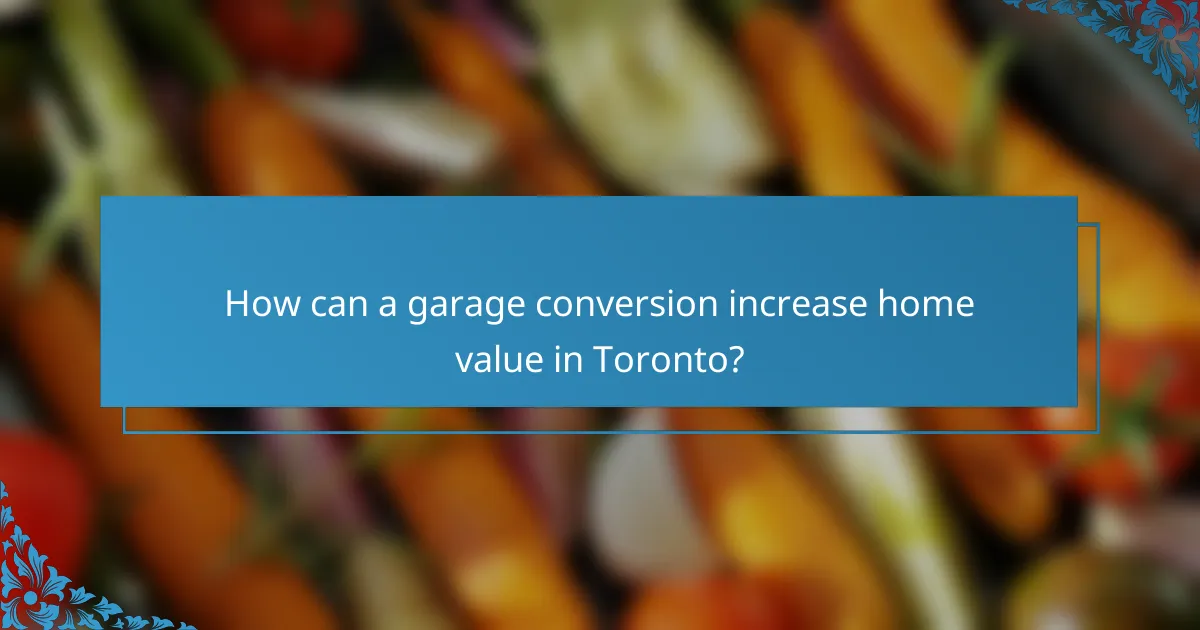
How can a garage conversion increase home value in Toronto?
A garage conversion can significantly enhance the value of a home in Toronto by transforming an underutilized space into a functional area. This not only appeals to potential buyers but also increases the overall square footage of the property, making it more desirable in a competitive market.
Enhanced property appeal
A well-executed garage conversion can greatly improve the aesthetic and functional appeal of a property. Buyers are often attracted to homes that offer versatile spaces, such as guest suites, home offices, or recreational areas. This added functionality can make a home stand out in listings, potentially leading to quicker sales and higher offers.
Consider investing in quality finishes and ensuring the new space blends seamlessly with the existing home design. This attention to detail can further enhance the property’s overall attractiveness.
Increased square footage
Converting a garage adds valuable square footage to a home, which is a key factor in property valuation. In Toronto, where space is at a premium, this additional area can be a significant selling point. Homebuyers often look for properties that maximize usable space, making a garage conversion a strategic investment.
When planning a conversion, ensure that the new space complies with local building codes and zoning regulations. This will help avoid potential issues during the sale process and ensure that the added square footage is officially recognized in property assessments.
Potential rental income
A garage conversion can also serve as a source of rental income, particularly if the new space is designed as a separate unit. In Toronto’s rental market, having an additional suite can attract tenants and provide a steady income stream, which can offset mortgage costs or fund further renovations.
When considering this option, ensure that the conversion meets local rental regulations and includes necessary amenities such as a kitchen and bathroom. This will not only make the space more appealing to renters but also ensure compliance with legal requirements.

What are the best uses for a converted garage in Ontario?
A converted garage in Ontario can serve various practical purposes, enhancing both functionality and property value. Popular uses include creating a home office, guest suite, or recreational area, each tailored to meet specific needs.
Home office space
Transforming a garage into a home office can provide a quiet, dedicated workspace away from household distractions. Consider adding insulation and soundproofing to create a comfortable environment, especially during Ontario’s colder months.
When designing your home office, ensure adequate lighting and electrical outlets for your equipment. A well-planned layout can maximize space, allowing for a desk, shelving, and storage solutions.
Guest suite
A garage conversion into a guest suite offers visitors privacy and comfort. This setup can be particularly appealing for family or friends visiting from out of town, providing them with their own space while staying in your home.
To create an inviting guest suite, focus on essential amenities like a bed, bathroom, and small kitchenette. Consider local zoning regulations to ensure compliance with any requirements for rental or occupancy permits.
Recreational area
Converting a garage into a recreational area can enhance your home’s entertainment options. This space can be used for a home gym, game room, or hobby workshop, catering to various interests and activities.
When designing a recreational area, think about flooring options that suit your intended use, such as rubber mats for a gym or durable carpet for a game room. Adding windows or skylights can improve natural light, making the space more inviting and enjoyable.
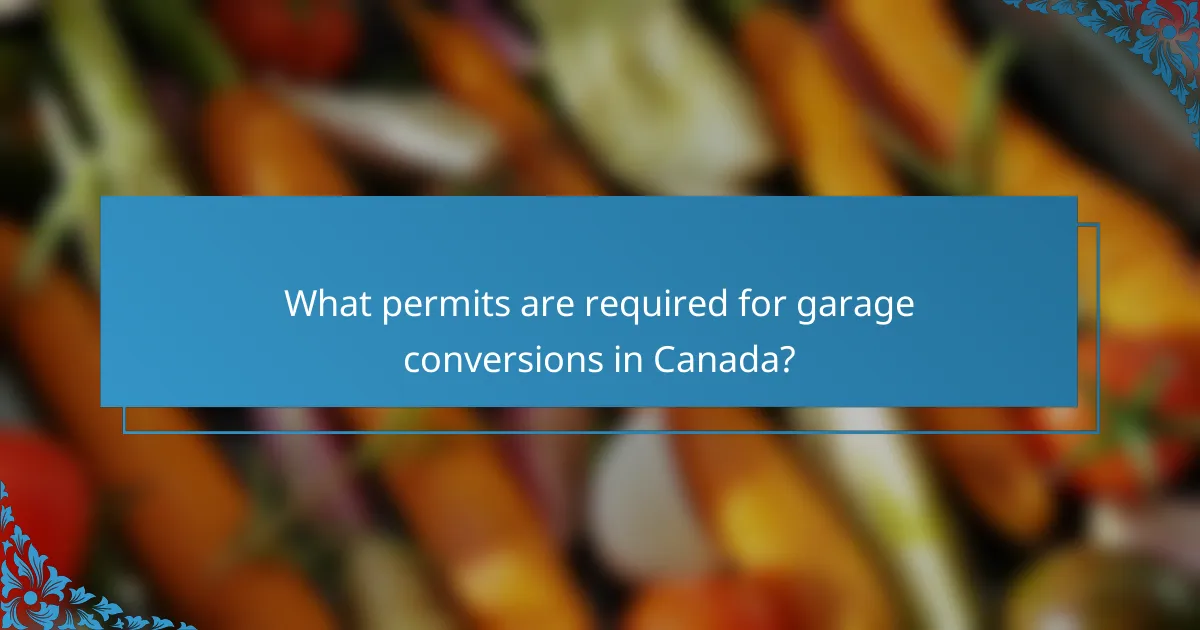
What permits are required for garage conversions in Canada?
In Canada, garage conversions typically require several permits to ensure compliance with local building codes and regulations. The specific permits needed can vary by province and municipality, so it’s essential to check with local authorities before starting your project.
Building permits
Building permits are essential for any structural changes, including garage conversions. These permits ensure that the construction meets safety standards and local building codes. To obtain a building permit, you usually need to submit detailed plans of the proposed conversion, including dimensions and materials.
Costs for building permits can range from a few hundred to several thousand Canadian dollars, depending on the complexity of the project and the municipality’s fee structure. It’s advisable to apply for the permit early in the planning process to avoid delays.
Zoning approvals
Zoning approvals determine whether your garage conversion complies with local zoning laws. These laws dictate how properties can be used and may impose restrictions on the type of dwelling you can create. For instance, some areas may not allow residential units in converted garages.
Before proceeding, check if your property is in a zone that permits residential conversions. If not, you may need to apply for a zoning variance, which can add time and complexity to your project.
Electrical and plumbing permits
If your garage conversion includes electrical or plumbing work, you will need specific permits for these systems. Electrical permits ensure that all wiring meets safety codes, while plumbing permits cover any new plumbing installations. These permits are crucial for ensuring the safety and functionality of your converted space.
Typically, you will need to hire licensed professionals to perform the work and pull the necessary permits. Costs for electrical and plumbing permits can vary, but they often range from a few hundred to over a thousand Canadian dollars, depending on the scope of the work involved.
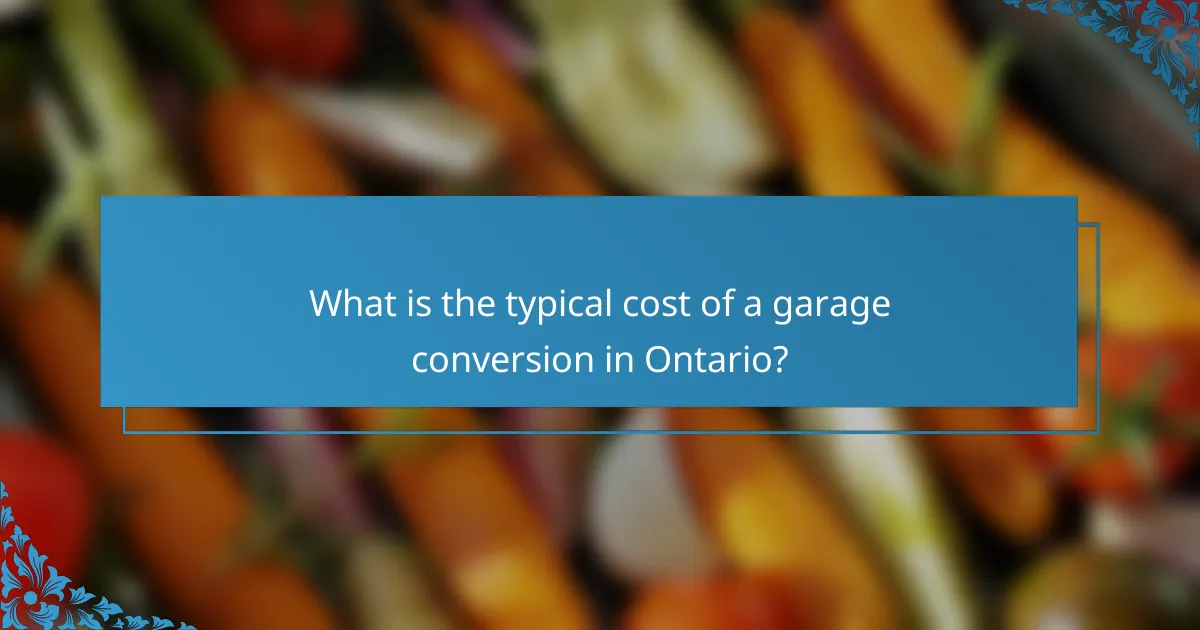
What is the typical cost of a garage conversion in Ontario?
The typical cost of a garage conversion in Ontario ranges from approximately CAD 15,000 to CAD 50,000. This price can vary significantly based on the extent of the renovation and the intended use of the new space.
Average cost range
The average cost for a garage conversion in Ontario generally falls between CAD 20,000 and CAD 40,000. Basic conversions, which may include insulation, drywall, and flooring, tend to be on the lower end of this spectrum, while more extensive projects that require plumbing or electrical work can push costs higher.
Homeowners should also consider additional expenses such as permits, design fees, and potential landscaping, which can add several thousand dollars to the overall budget.
Factors influencing pricing
Additionally, local labor rates and the need for specialized contractors can affect pricing. For instance, if the conversion requires structural changes or compliance with local building codes, costs may increase accordingly.
Financing options available
Another option is to explore renovation loans specifically designed for home improvements. These loans often have favorable terms and can cover a portion of the conversion costs, making the project more financially manageable.
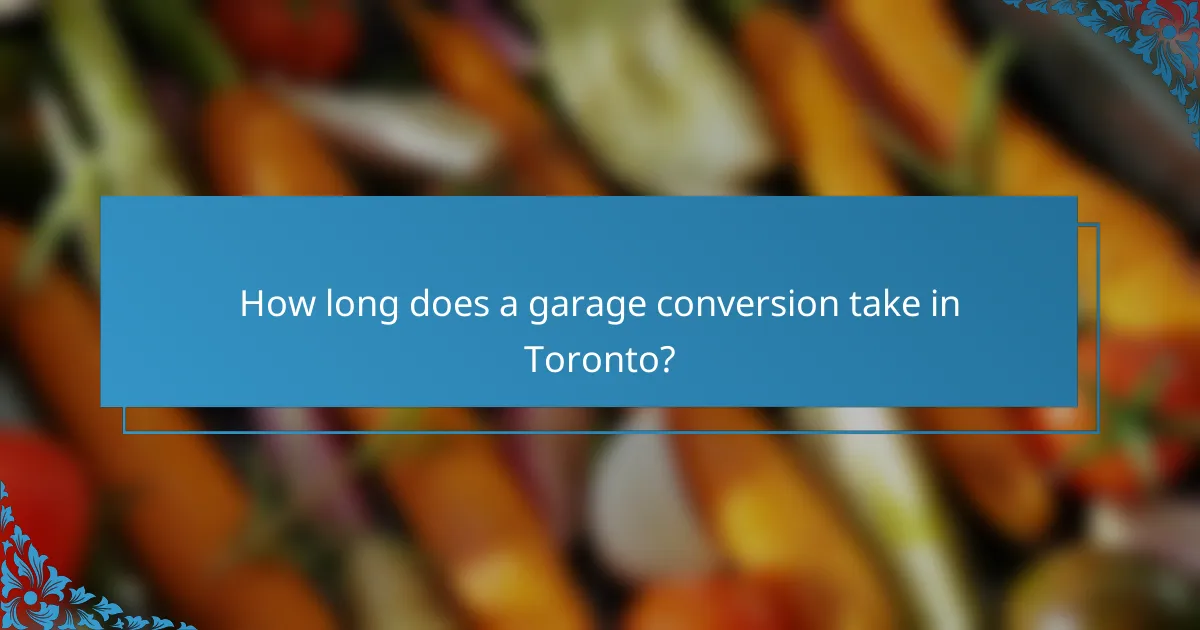
How long does a garage conversion take in Toronto?
A garage conversion in Toronto typically takes between 4 to 12 weeks, depending on the complexity of the project and local regulations. This timeframe includes planning, permits, and construction phases.
Typical project timeline
The timeline for a garage conversion generally consists of several phases: planning, obtaining permits, and the actual construction. Planning can take a few days to a couple of weeks, while permit approval may take anywhere from a week to several weeks, depending on the municipality’s workload.
Construction itself usually spans 2 to 8 weeks, depending on the extent of the renovations. Simple conversions may be completed quickly, while more complex projects, such as adding plumbing or electrical work, will require additional time.
Factors affecting duration
Several factors can influence the duration of a garage conversion in Toronto. The size of the garage, the scope of the renovation, and whether structural changes are needed will all impact the timeline. For instance, a straightforward conversion into a living space may take less time than one that involves extensive remodeling.
Additionally, the permitting process can vary significantly based on the specific requirements of the City of Toronto. Delays in obtaining permits or inspections can extend the overall project duration. Weather conditions and contractor availability may also affect how quickly the work can be completed.
